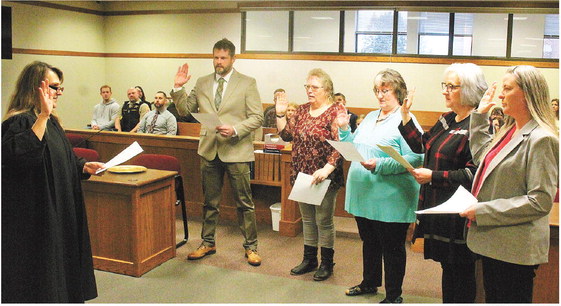Spencer school to ask for 1-year cap exemption
With the Spencer School District’s current 5-year revenue cap exemption scheduled to sunset after the 2020-21 school year, the usual course of action would be to ask voters to approve another amount for the next five years. This, however, is not a usual year.
The district Board of Education will veer from its normal course and ask voters in the April 6 spring election to approve a cap exemption extension of just one year, for $975,000. That move would provide the district with enough money to get through another year while it assesses a recent decline in enrollment and a new state budget and the impact those will have on district finances.
The Board on Jan. 20 officially approved the resolution that will place a revenue cap exemption referendum question on spring ballots. The question will ask voters to authorize the district to collect $975,000 more in local property taxes for the 2021-22 year than it could under state revenue limit laws. It’s the same amount voters approved in 2016 when the district proposed a 5-year exemption to allow the district to function without having to reduce staff and/or programs.
District Administrator Mike Endreas said the normal course of action for Spencer and many other rural districts over the past 25 years has been to ask for 4- or 5-year cap exemptions as schools were able to project their financial needs over such a time period. This year, with impacts from the COVID-19 pandemic still being felt, Endreas said the Board cannot so easily look five years ahead.
“When we ran our funding formula, there were variables we weren’t comfortable with,” he said. “We just didn’t feel real comfortable for the Board to project that far out.”
One of the variables of which Endreas speaks is student enrollment. With some families opting to keep their children out of school rather than expose them to COVID- 19 spread, the district’s enrollment dropped by approximately 80 students. Endreas said the district graduated a larger than normal senior class last year and expected a decline of around 30 students, but the decision by families to keep their children at home or enroll them in online virtual schools swelled that number.
“They are pursuing other options,” Endreas said. “It was a lot due to the pandemic and home-schooling.”
Another unknown for the district looking forward is the state financial picture. It too is dealing with the financial impacts of a pandemic, and a new 2-year state budget will be approved later this year. Until the district sees that budget and what it might mean for state revenue going forward, it is not in a position to form long-term budgetary projections.
COVID-19 has impacted the district budget this year, as it has had to hire more staff to handle contact tracing work for students who have had the virus or been in contact with someone who has. There has been a decrease in costs, too, such as in transportation, as the district offers virtual learning every Wednesday so no buses run that day.
For the coming year, Endreas said an extension of the $975,000 cap exemption will still leave the district short of expected needs, but the Board thought it best to simply ask for an extension rather than raise the amount.
“The $975,000 isn’t going to balance our budget next year. We will be in a little bit of deficit,” he said. “We can absorb that. It’s enough to get through the next year.”
What the decision to ask for a 1-year extension also means is that the district will have to come back to voters again in April 2022 to ask for more money. That question will likely be for a longer term, but it still means the district will be running three referendums in a 4-year period. It also held one in April 2019 to ask voters for funding to build a new gymnasium dome and undertake remodeling projects elsewhere in the school complex. That referendum was about improving the district, though, Endreas said, and the dome construction project now underway has led to a boost in morale for the district.
Endreas noted that the 1-year cap exemption will have little impact on current tax rates, as the district has already been collecting that amount for the past five years. Another year at the same level will allow the Board to assess its situation and be better prepared before asking for the next 5-year exemption amount.
“It’s kind of a let’s-take-a-deep-breath year and let’s get things squared away,” he said.
Endreas said the Board at its Feb. 17 monthly meeting will set some informational meetings for residents to attend to learn more about the 1-year extension question.



